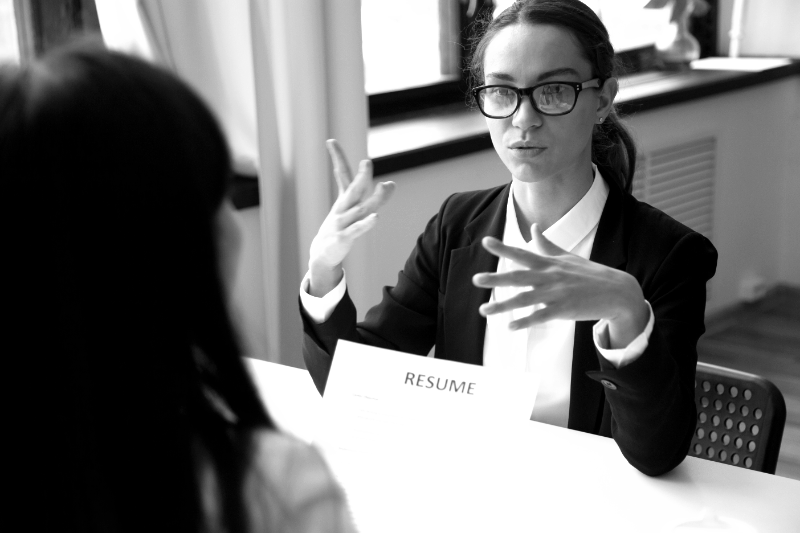Getting ready for highly coveted, high-paying interviews can sometimes feel downright overwhelming. You know you’ll be under such intense scrutiny, having to field all those probing questions on the spot and feeling the weight of everything on the line.
Employers aren’t just looking at what skills you bring to the table or qualifications on paper, though. They want to see if you have the poise, confidence, and strategic thinking to excel even when the pressure’s on, too. Developing those top-notch job interview skills opens so many doors — it’s the key to those lucrative careers and financial security you work so hard for.
This article is here to help you hone the job interview skills you need. It covers how to prepare thoroughly, how to have effective communication down pat, and how to use confidence-building techniques. Plus, you’ll learn tips for follow-up approaches that maximize your success.
The importance of job interview skills
Having the needed skills and experience on paper is step one. But your resume only gets you a foot in the door for a chat. It’s not guaranteed that the boss will pick you just because your words look good.
Where you really shine, or sink, is under the interview lights. Even if you look stellar on paper, this is where you bring your best game face and back it up by communicating why you are better than the other candidates.
Most importantly, paint them a clear picture of the value you’d add each day. Share stories highlighting your flexibility, strengths, and drive for their mission in a likable, energetic way. Own that spotlight, and you’ll own the job offer!
Making a strong first impression
A strong first impression in a job interview matters a lot. First and foremost, the initial few minutes of the interview establish the interviewer’s initial perception of you, setting the tone for the rest of the conversation. Here are some suggestions on how to come across well in interviews:
- Be punctual. Show up a few minutes early, so you start on a high note. Being on time shows respect for the interviewer’s schedule and that you’re professional and reliable.
- Dress appropriately. Your clothes should feel comfortable while still looking sharp. Find pieces you feel confident in so you can focus on the conversation, not how you look.
- Come prepared and organized. Bring copies of your resume as a courtesy, but don’t hide behind papers. Engage openly and let your authentic self shine through. Employers will want to see the real you.
Demonstrating fit for the role
Interviewers need to see why you, in particular, are the perfect person, not just another qualified applicant. You want them to walk away knowing, “This is the one — his/her qualifications plus personality will directly solve X, Y, and Z for our team.”
But interviewers cannot verify bullet points alone — they want thick context. Using STAR (Situation, Task, Action, Result) grounds your abilities in reality. Here’s an example of how you can use the STAR technique for interviews:
Situation
Describe the context and challenge you faced. For example, “There was a disagreement between my team and the client on the direction for a new product campaign.”
Task
Explain your main objective or goal. For example, “My goal was to develop a marketing strategy that aligned with the client’s vision while also being effective.”
Action
Outline the steps you took to address the situation and complete the task. For example, “I held collaborative meetings with the client to better understand their preferences. I then worked with my team to revise the campaign plan, incorporating the client’s ideas while also using our own expertise. We presented the updated proposal to the client and received their approval.”
Result
Share the positive outcomes and benefits that were achieved. For example, ”The new campaign exceeded the client’s initial goals for website traffic, leads, and service sign-ups by 25%. The client was very satisfied with the results and commended my ability to balance their needs with effective marketing strategies.”
Interviewers don’t have time to decode rambling responses, so guiding them through the context, your role, your steps, and your outcome just makes it digestible.
Crucial job interview skills to master
The data shows that the skills required for roles have changed by 25% since 2015. This rate of change is expected to accelerate by 2030, with skills for roles changing by at least 65%. While people’s talents evolve constantly, core strengths are forever transferable between roles. Focusing your energy on deeply honing those fundamentals will keep you adaptable and hireable anywhere. Here are some job interview tips for interviewees:
Thorough company research
Researching the company online is super important before an interview. You can gain valuable insight by checking out their “About” page. This will give you a primer on their mission, values, and unique selling points.
Familiarize yourself with the company’s basics, such as its size, location, history, and other key information. Carefully review the job description to understand the specific requirements, skills, and responsibilities for the role you’re applying for.
Then, expand your research beyond the company’s website. Google News is a goldmine for fresh updates. See what projects they’re buzzing about, deals they’ve made, and milestones they’ve hit. Knowing their most recent celebrations shows you’re tuned into their moves. And definitely dive deep into their social media. Follow along for real-time glimpses of new client wins or team successes. Seeing what gets people pumped gives perspective into the company’s culture.
Read more: Transforming Workplace Tension Into Team Success
Practicing common interview questions
Practicing interview questions is really helpful for feeling more comfortable and confident when the actual interview happens. It gives you a chance to refine your answers, making them clearer and better tailored to the specific job and company you’re interviewing for. When you feel well-prepared from all that interview practice, you’re much less likely to feel anxious or flustered during the real interview. Here are the top interview tips you can use:
- Prepare a list of questions. The first tip is to gather a list of common interview questions. You can find these on various career advice websites or by researching typical questions for the job you’re applying for. This will give you a good sense of the types of things you might be asked during the interview.
- Do interview practices alone. Start practicing answering those questions out loud on your own. This will help you get comfortable with your responses and identify areas where you might need to provide more detail or clarify your answers.
- Record yourself. Consider recording yourself answering the questions. Watching the recordings back can be really insightful. You can pick up on things like your eye contact, facial expressions, posture, hand gestures, and tone of voice. Seeing it for yourself makes it easier to make adjustments and ensure your responses come across as natural and confident.
- Use the STAR technique for interviews. When it comes to behavioral questions, like ‘Tell me about a time you dealt with a difficult coworker,’ the STAR technique discussed earlier can be really useful. It helps make sure your answers are clearly detailed and really get at what the interviewer is looking for.
- AI can help with mock interviews. While nothing replaces real practice, AI tools allow you to experience simulated interviews safely from home. Chatbots utilize natural language processing to ask common questions and listen to your responses in real-time.
Read more: Boost Your Productivity with AI-Powered Tools
Mastering professional presentation
The interview is people’s first chance to meet you face-to-face. Your actions and attitude in the meeting set the tone for how they’ll view you as a potential new hire. By carrying yourself in a professional, put-together way, you show that you’d be a good fit, personality-wise and culturally. Here are things you should consider:
Use confident body language
The way you carry yourself holds meaning in an interview. Sitting tall with good posture shows you’re comfortable and engaged. Make eye contact to show you’re listening attentively. Don’t slouch or fidget — that might make it seem like you’re uninterested or uncertain.
Mirroring how the interviewer sits or leans in can help you bond. Even little things like copying their posture subtly say, “We’re connecting.” Acting self-assured through your body language tells interviewers you’ll be poised and focused in everyday work situations.
Speak clearly
The way you talk shows off your communication and presentation skills to interviewers. Use clear language when answering questions. Keep filler words like “um” or “like” out of your speech as much as possible.
Taking a brief second between complete thoughts can help you share your full answer coherently. Slowing down and choosing your words well proves you can represent the company through polished conversations with anyone you encounter on the job.
Show interest
Come ready with questions that demonstrate you researched the company and can’t wait to contribute. Ask about day-to-day projects, office culture, and their goals — anything to prove this role is your top priority now. Expressing what draws you to their mission and vision shows you’ll bring passion, not just skills, to the role daily.
Be respectful
Being respectful is so important to leave a good impression in any interview. Address the hiring managers politely by their proper titles like Mr., Mrs., or Ms. unless they say to do otherwise. Mind your words and actions — interview conversations aren’t the place for rude remarks or unnecessary strong feelings. A respectful demeanor puts everyone at ease so they can get a true sense of your character. Treat your interviewers the way you’d want to be treated overseeing important decisions.
Following up
Following up after the interview shows you care a lot about the role. Drop them a quick note or call thanking them again for their time within 24-48 hours after the interview. It reaffirms that you’re excited while also letting them know to let you know if any new details arise. Here are some great strategies when following up:
- Send a concise, personalized email to each person you interviewed with.
- Express your appreciation for their time and consideration.
- Keep the email focused and professional, around 3-4 paragraphs.
Handwritten note
- A handwritten thank-you note can make a great impression and stand out.
- Use high-quality stationery or a professional-looking card.
- Mail the note promptly, as it may take a few days to arrive.
Phone call
- Follow up with a brief, professional phone call to reiterate your interest.
- Thank the interviewer for their time and let them know you appreciated the conversation.
- Use this opportunity to address any additional details or questions you have.
- Keep the call concise, around 5-10 minutes.
Read more: On a Job Hunt? Productive Tips for Effective Job Searching
In conclusion
Developing practical interview skills through thorough preparation and practice is important if you want to attract high-paying career opportunities. When you have the right techniques, you can showcase what makes you stand out from the other candidates.
This is your chance to take control of your professional destiny — see every interview as an opportunity to show off your exceptional abilities and pave the way towards lasting success. With focus and effort, you hold the power to market yourself as the best fit and take that critical next step towards the bright future you’ve worked hard to build.
If you would like to see more resources on getting a job, check out the Affluence Science Labs. The lab uses the research of the Institute for Life Management Science to produce courses, certifications, podcasts, videos, and other tools. Visit the Affluence Science Labs today.
Photo by yanalya on Freepik


